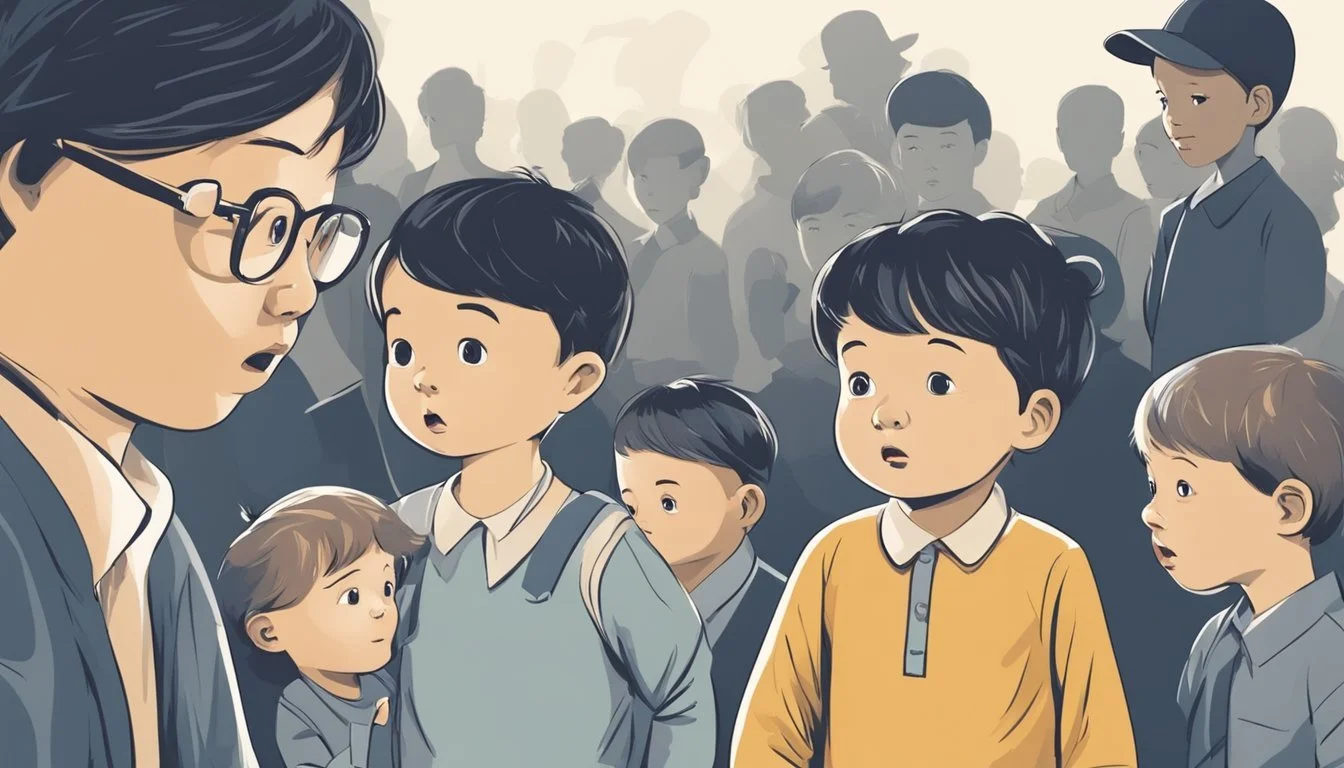13 Tactics Narcissists Use to Manipulate Their Children
A Comprehensive Guide
Narcissistic parents often engage in various manipulative tactics to maintain control over their children. These behaviors can cause long-term emotional and psychological harm, making it crucial to recognize and understand these tactics.
Understanding these methods is essential for those who have encountered or are currently dealing with narcissistic parenting. Identifying these behaviors can help in developing strategies to mitigate their impact and foster healthier relationships. Through this article, insights are provided into the common manipulative techniques used by narcissists against their children, emphasizing the importance of awareness and resilience.
1) Gaslighting
Gaslighting is a manipulation tactic narcissists use to make their children question their own reality. By persistently denying facts or events, they aim to confuse and control their victims.
One common gaslighting technique is outright denying reality, even when evidence is present. This method causes the child to doubt their own memory and perception.
Narcissistic parents often use phrases like "You're too sensitive" or "You're overreacting." These dismissive comments invalidate the child's feelings and create self-doubt.
Gaslighting can include rewriting history. Narcissists may claim events happened differently or never happened at all, further eroding the child's sense of reality.
They may also turn the blame around, making themselves the victim. By doing so, they shift the focus away from their actions and onto the child's supposed faults.
This constant manipulation can lead to long-term psychological effects. Children of narcissistic parents often struggle with low self-esteem and chronic self-doubt.
Recognizing these tactics is crucial. Understanding how gaslighting works is the first step in breaking free from its effects. For more details on specific manipulative phrases used, visit Simply Psychology's article.
2) Triangulation
Triangulation is a manipulation tactic frequently used by narcissistic parents to maintain control over their children. This method involves bringing a third person into the dynamic to create a psychological threesome.
The third party could be another parent, a sibling, or even a relative. The narcissistic parent uses this person to manipulate the emotions and reactions of their child. This can foster competition, jealousy, and divide between the children.
For instance, a mother might tell one child that their sibling is more successful, thereby planting seeds of rivalry. This keeps the child seeking validation and approval, ensuring the narcissist remains in control.
It often leads to confusion and distrust among siblings. The child being manipulated ends up questioning their own perception and feelings while seeking to please the parent at all costs.
Triangulation can create long-lasting damage to the child's relationships and self-esteem. The continuous need for approval and fear of rejection can persist into adulthood. Being aware of this tactic is the first step to mitigating its impact.
For more on triangulation and how it is used to control relationships, visit Triangulation: The Narcissists Best Play.
Dealing with triangulation often requires external support, such as therapy, to rebuild trust and confidence in personal relationships without the toxic influence of the narcissist.
3) Scapegoating
Scapegoating is a prevalent tactic used by narcissistic parents to manipulate their children. In this dynamic, one child is singled out and blamed for the family's problems. This child, known as the "scapegoat," is subjected to constant criticism and unfair treatment.
Narcissistic parents use scapegoating to divert attention from their own shortcomings. By projecting their faults onto one child, they can maintain an image of perfection. This behavior creates intense sibling rivalry, as the scapegoat child often becomes the target of the other siblings' frustrations.
Studies have shown that scapegoated children may develop low self-esteem and anxiety. This role can have long-lasting effects on their mental health, making it difficult for them to form healthy relationships in the future. The scapegoated child is often denied validation and support, further increasing their emotional distress.
In households where scapegoating occurs, the favored child, often referred to as the "golden child," may be treated with excessive praise and leniency. This imbalance in treatment can confuse the scapegoat and perpetuate feelings of isolation and unworthiness. Narcissistic parents deliberately foster this division to control their children and reinforce their own authority.
Scapegoating is a damaging and manipulative tactic that can leave deep emotional scars on the targeted child. Understanding this behavior is essential for recognizing and addressing its impact on mental health.
4) Projection
Projection is a defense mechanism often used by narcissistic parents. They transfer their negative traits, feelings, or actions onto their children, accusing the children of behaviors or attitudes that the parents themselves exhibit.
This tactic allows narcissistic parents to avoid taking responsibility for their actions. Instead, they place the blame squarely on their children, making them feel guilty or shameful for traits they do not possess.
For example, a narcissistic parent may accuse a child of being selfish or ungrateful when in reality, the parent is the one displaying those behaviors. This can deeply confuse the child and lead to self-doubt.
The use of projection can also undermine a child's self-esteem. Constantly being blamed for the parent's faults can make the child feel inherently flawed, fostering a negative self-image.
In some cases, projection can extend to the parent's own insecurities or fears. By attributing these to the child, the narcissistic parent ensures that they do not have to confront their vulnerabilities. This manipulative tactic helps them maintain a facade of superiority and control.
5) Guilt Tripping
Guilt tripping is a frequent tool narcissistic parents use to manipulate their children. They often blame their children for their own actions or feelings. For instance, they might say, "If it weren't for you, I would be happier."
This tactic makes the child feel responsible for the parent's emotional state. Narcissistic parents may remind their children of sacrifices they made. Comments like "After all I've done for you, this is how you repay me?" are common.
Guilt tripping can also include passive-aggressive remarks. Statements like "I guess you don’t care about me" aim to induce guilt and compliance. Children manipulated this way often feel they can never do enough to make their parents happy.
These tactics can be subtle and insidious. Over time, the child may develop low self-esteem and a constant need for approval. Recognizing these behaviors is crucial for anyone dealing with narcissistic parents to protect their emotional well-being.
Narcissistic parents might also distort reality, making their children doubt their perceptions. This adds an element of gaslighting to the guilt tripping, further controlling the child's responses and emotions.
6) Love Bombing
Love bombing is a tactic used by narcissistic parents to manipulate their children. It involves an excessive display of affection and attention designed to make the child feel special and valued.
This method is often employed at the beginning of a relationship or when the parent needs something from the child. It creates an emotional dependence, making the child more susceptible to future manipulation.
Narcissistic parents may use love bombing to mirror their child's interests and passions. For instance, a parent might feign interest in baseball to superficially align with their child's love for the sport.
Once the child is emotionally attached, the narcissistic parent gradually shifts from idealizing to devaluing and discarding the child. This cycle of idealization and subsequent withdrawal keeps the child in a state of confusion and seeking approval.
The manipulative intent behind love bombing is to create a dependency loop where the child continually seeks validation from the parent. This prevents the child from developing a healthy sense of self-worth independent of the parent's approval.
Understanding love bombing is essential for recognizing the emotional manipulation at play and breaking free from the unhealthy dynamics created by narcissistic parents.
7) Silent Treatment
The silent treatment is a commonly used tactic by narcissistic parents to exert control over their children. It involves deliberately ignoring and avoiding communication with the child as a form of punishment or manipulation.
Narcissistic parents may use the silent treatment to create a sense of unease and insecurity in their children. This strategy forces the child to seek approval and validation from the parent to restore communication.
By withholding communication, the narcissistic parent can manipulate the child's behavior and emotions. This tactic serves to reinforce the parent's dominance and power in the relationship.
In some cases, the silent treatment can last for extended periods, causing significant emotional distress to the child. The lack of communication can lead to feelings of isolation and confusion.
For narcissistic parents, the silent treatment is a way to avoid accountability and control the narrative. It allows them to dismiss the child's feelings and deny any wrongdoing.
The silent treatment is particularly harmful because it disrupts healthy communication patterns. Children may struggle with expressing their emotions and may develop long-term issues with trust and self-worth.
This form of manipulation can make children feel they are walking on eggshells, constantly trying to avoid triggers that might result in more silence. This dynamic can severely impact their emotional and psychological development.
8) Flying Monkeys
Flying monkeys are individuals who a narcissist manipulates into assisting in their schemes. These can be family members, friends, or colleagues. Narcissists use charm and deceit to enlist their help. The recruited individuals often believe they are siding with the victim of the situation.
Narcissists benefit from flying monkeys in several ways. Flying monkeys might spread rumors or spy on others, relaying information back to the narcissist. This can be damaging to relationships and reputations.
Flying monkeys also provide validation and reinforcement for the narcissist. They often support the narcissist's gaslighting tactics, making the victim question their perceptions. This dynamic deepens the narcissist's control over their target.
Furthermore, flying monkeys can include people with their own motives. For instance, some may seek to gain power or favor from the narcissist. In some cases, individuals with anxiety might gravitate toward the narcissist due to their perceived confidence and authority. Learn more about flying monkeys in narcissism and their tactics.
Unwittingly or not, these participants play a critical role in the narcissist's manipulation strategy. They help isolate and destabilize the victim, which amplifies the narcissist's influence and control. This makes it exceedingly difficult for the victim to break free from the narcissist's grip.
9) Hoovering
Narcissistic hoovering is a manipulative strategy used to draw someone back into a relationship or maintain control over them. It frequently involves tactics aimed at reigniting emotional connection or dependence.
One common method is "love bombing," where the narcissist bombards the child with affection, gifts, and compliments after periods of abuse or neglect. This creates confusion and false hope in the targeted individual.
Narcissists may also exploit significant dates, such as birthdays or anniversaries, to initiate contact. They often mask their intentions under the guise of being caring or supportive, which further manipulates the child's emotions and boundaries.
Another hoovering tactic includes making apologies for past behavior, offering promises of change, and showcasing remorse. These attempts at reconciliation are rarely genuine and serve primarily to regain control.
The intermittent nature of these overtures helps to maintain a cycle of emotional dependency. Children often find themselves trapped in a loop, hoping for lasting change while repeatedly experiencing similar patterns of manipulation and control.
Recognizing these behaviors is crucial for breaking free from the toxic cycle and establishing healthier boundaries. Understanding how narcissists use hoovering can empower individuals to resist these manipulations effectively. For more detailed examples of these behaviors, visit Verywell Mind's article on Narcissistic Hoovering.
10) Invalidation
Invalidation occurs when narcissistic parents dismiss or undermine their child's feelings, thoughts, or experiences. This tactic often makes the child question their reality and may leave them feeling unimportant or unheard.
These parents might tell their children that they are too sensitive or overreacting. Over time, the child learns to doubt their emotional responses and may struggle with self-esteem.
Invalidation can also involve minimizing the child’s achievements or positive qualities. Narcissistic parents might downplay successes, suggesting they are not a big deal or were easy to accomplish, fostering a sense of inadequacy.
By constantly invalidating their children’s experiences, narcissistic parents maintain control. They shape the child's perception of themselves and the world, making it difficult for them to form a stable sense of self.
This manipulation method can lead to long-term emotional and psychological issues. Children of narcissistic parents may experience confusion, anxiety, and difficulty trusting their own feelings, impacting their relationships and overall mental health.
Invalidation is a subtle yet powerful form of manipulation that reinforces the narcissistic parent's dominance and control over their child. It's essential to recognize these patterns and seek support to mitigate their effects.
11) Blame Shifting
Blame shifting is a manipulation tactic frequently used by narcissists to avoid responsibility. By redirecting fault to others, they maintain control and preserve their self-image. This can be particularly confusing for children, as they may start to question their own actions and self-worth.
In interactions with their children, narcissists often employ blame shifting to make them feel guilty or responsible for issues. This serves to divert attention from the narcissist's own shortcomings or mistakes.
An example of this behavior is when a narcissistic parent blames their child for the parent's emotional outbursts or failures. Phrases like "If you had just listened" or "It's your fault I got angry" are common. This tactic erodes the child’s confidence and sense of reality.
Furthermore, blame shifting can intertwine with other forms of manipulation like gaslighting, where the narcissist distorts the child's perception of events. This makes it even harder for the child to recognize the narcissist's behavior as abusive.
To understand more about how narcissists manipulate through blame shifting, see this detailed explanation on Narcissist Blame Shifting.
12) Smear Campaigns
Narcissists often use smear campaigns as a tactic to manipulate and control others. They spread false information about their children to damage their reputation and isolate them from their support network. This helps maintain the narcissist's control over the child.
Smear campaigns can involve exaggerating the child's flaws or fabricating stories about their behavior. This creates a narrative that paints the narcissist as the victim and the child as the problem. The narcissist leverages these lies to gain sympathy and support from others.
The misinformation spread in a smear campaign can lead to significant emotional and psychological harm for the child. They may feel misunderstood or unfairly judged by those who believe the narcissist's lies. The smear campaigns also make it difficult for the child to form trusting relationships with others.
To combat smear campaigns, children of narcissists can seek support from trusted individuals who understand narcissism. Working with a therapist can help them navigate these challenges and build resilience against the narcissist's tactics. The support of a mental health professional can be a critical factor in overcoming the effects of a smear campaign.
For more insights on dealing with smear campaigns, consider visiting Psychcentral and Psychology Today.
13) Emotional Blackmail
Emotional blackmail is a tactic where narcissistic parents manipulate their children by exploiting their emotions. This involves creating feelings of fear, obligation, or guilt to achieve compliance.
They may imply dire consequences if the child doesn't obey. This can manifest as threats of withdrawal of love or support, often leaving the child feeling insecure.
Narcissistic parents may also use phrases like, "If you loved me, you would do this," leveraging the child's desire for approval. This tactic effectively undermines the child’s autonomy and self-esteem.
By playing the victim or portraying themselves as helpless, they impose a sense of responsibility on the child. This emotional burden traps the child in a cycle of trying to fulfill the parent's needs.
Gaslighting, another form of emotional manipulation, involves distorting the child's perception of reality. This can lead to confusion and self-doubt, making it harder for the child to trust their own feelings and judgments.
These tactics are damaging because they erode the child's confidence and sense of self. It’s essential for those who recognize these patterns to seek support and establish boundaries. Learn more about these manipulation tactics at PsychCentral.
Understanding Narcissistic Manipulation
Narcissistic manipulation involves the strategic use of psychological tactics to control and dominate children. It can deeply affect a child's emotional and cognitive development.
What Is Narcissism?
Narcissism is defined by an inflated sense of self-importance, a deep need for admiration, and a lack of empathy for others. Narcissistic individuals often view themselves as superior and deserving of special treatment. They may exploit relationships to meet their own needs for attention and validation.
Narcissists employ tactics like gaslighting, guilt-tripping, and emotional blackmail to maintain control. These behaviors can distort reality, making the victim doubt their perceptions and emotions. In family settings, narcissistic parents can be particularly damaging, often leading their children to develop low self-esteem and anxiety.
Psychological Impact on Children
Children of narcissistic parents often experience significant psychological challenges. They may grow up in environments where their feelings and needs are dismissed or minimized. This can lead to struggles with self-worth and emotional regulation.
Narcissistic parents use various manipulative tactics to maintain control. Techniques such as labeling and shaming can make children feel inadequate and dependent. Over time, these children may internalize negative beliefs about themselves, resulting in chronic self-doubt and insecurity.
Children exposed to such environments might also develop unhealthy coping mechanisms. They may become overly accommodating to avoid conflict or adopt narcissistic traits themselves. Long-term effects can include difficulties in forming healthy relationships and increased vulnerability to mental health issues like depression and anxiety.
Emotional and Psychological Tactics
Narcissistic parents often employ a range of emotional and psychological tactics to maintain control over their children. These tactics can distort the child's sense of reality and foster dependency on the parent.
Gaslighting
Gaslighting is a method where the narcissistic parent makes the child question their own memories and feelings. This tactic involves consistently denying or distorting events to confuse the child. For instance, a parent might insist that certain hurtful incidents never happened, even when the child clearly remembers them.
By manipulating reality, the parent can make the child feel unsure of themselves and more reliant on the parent for truth and validation. This not only ensures the child's compliance but also keeps them from trusting their own judgment. Children subjected to gaslighting often experience anxiety, self-doubt, and may eventually internalize the false narratives provided by the parent.
Triangulation (Playing Family Members Against Each Other)
Triangulation occurs when a narcissistic parent manipulates relationships within the family to create divisions and conflicts. This method involves the parent positioning themselves as the central figure, often by pitting one child against another or against other family members.
The parent may share private information or spread lies to create mistrust and competition among siblings. This tactic fosters dependency on the narcissistic parent, as the parent becomes the only perceived source of support or truth. As a result, the targeted individuals may feel isolated and more controllable.
Triangulation can leave lasting damage on familial relationships and create an environment of constant tension and insecurity. The ongoing conflict ensures that the parent remains at the center of attention, maintaining their power and control within the family dynamic.







